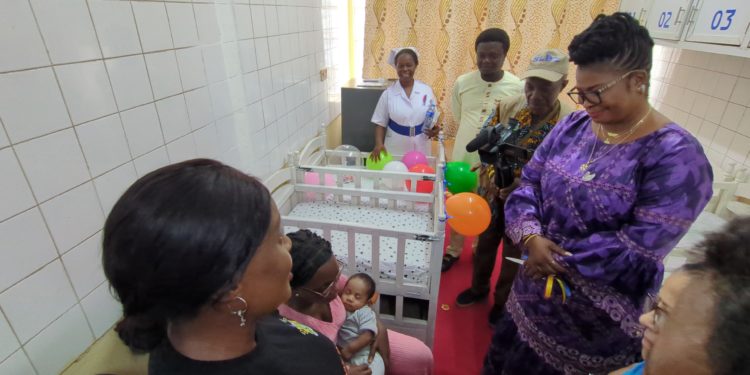By Kemo Cham
Sierra Leone’s first ever workplace lactation room was inaugurated on Friday, August 1st, 2025, marking a major leap in the country’s effort towards ending malnutrition.
A workplace lactation room is a private space that is designated for employees to breastfeed their babies. This pioneering facility is housed within the Princess Christian Maternity Hospital (PCMH), the country’s main maternity care center, located in the east end of the capital, Freetown. It is part of an initiative of the Scaling Up Nutrition and Immunization (SUNI) movement, and it is implemented by the SUNI Civil Society Alliance.
Friday’s event, held in the conference hall of PCMH, brought together stakeholders and other key actors across relevant government ministries, departments and agencies, as well as development partners in the health sector.
Nenebah Jalloh, National Coordinator at the SUN Secretariat and chairperson of the event, described the initiative as a practical and strategic investment in the health and productivity of the female workforce.
“This initiative is a clear demonstration of our collective commitment to advancing gender responsive nutrition access in Sierra Leone,” said the veteran nutritionist and dietician.
The SUN movement is a global initiative that aims to end malnutrition in all its forms. Led by countries, it brings together governments, civil society, the United Nations, donors, businesses, and researchers to work towards improving nutrition outcomes. It focuses on creating a coordinated, multi-stakeholder approach to address the public health issue, with a particular emphasis on the first 1,000 days of life – from pregnancy to age two.
In Sierra Leone, the SUN movement is coordinated by a Secretariat housed within the office of the Vice President, reflecting the government’s commitment to tackling malnutrition.
The SUNI Civil Society Alliance, also known as the Sierra Leone SUNI Civil Society Platform, is a key component of country’s SUN Movement. Its membership cuts across the 16 districts of the country, among them the local NGO FOCUS 1000, which currently hosts the Secretariat as chair, and Helen Kella International as co-chair. They also include CRS, and the Children Advocacy Forum (CAF-SL), which is implementing this workplace lactation room project.
Mohamed Samura, Programmes Manager at CAF-SL, said that the lactation room project is a pilot initiative that targets three sectors – a health facility (PCMH), a local market and private company (a bank). The plan, he noted, is to expand it across the country as soon as possible.
“Basically we are looking at mechanisms for female workers to be able to breastfeed and at the same time work,” he stated. “What we have learnt over the years is that within the workspace, female workers have not been fully supported. In some offices, in fact, it is prohibited for female workers to come with their babies while they are working.”
For Dr Amadu Sesay, Medical Superintendent at PCMH, hosting the facility is a “great opportunity,” describing the initiative as transformative given the potential impact it would have on the care they provide.
“When you consider the fact that the majority of our health workforce are female, some of them go through pregnancy and child birth and they have to juggle between caring for the babies, breastfeeding and work…Combining these is an arduous task for a woman,” he said.
“The fact that PCMH was selected makes me happy all the more,” he added.
Dr Sesay assured the donors that the facility would be utilized fully as intended.
Malnutrition is a significant public health issue worldwide, affecting both developed and developing countries. It encompasses a range of conditions, including undernutrition (lack of sufficient nutrients) and overnutrition (excessive intake of certain nutrients). Malnutrition has far-reaching consequences, impacting health, development, and economic productivity.
Sierra Leone’s multi-sector strategy to reduce malnutrition is aligned with national and international goals, with emphasis on an integrated approach addressing food access, maternal and child care, and sanitation. Key initiatives include improving breastfeeding and complementary feeding practices, increasing micronutrient intake, and enhancing household food security. Exclusive breastfeeding is a critical aspect of this.
The inauguration of the PCMH lactation room coincides with the commencement of the week long commemoration of World Breastfeeding Week (WBW) – August 1st to 7th – during which awareness is raised on exclusive breastfeeding.
While exclusive breastfeeding rates have improved over the years in Sierra Leone, a significant percentage of children still suffer from malnutrition, including stunting and wasting, according to government data.
The government and its partners have implemented several initiatives geared towards addressing gaps, among them the enactment of the Breast Milk Substitutes Act in 2021, which was designed to promote and protect breastfeeding while regulating the marketing of breast milk substitutes.
Speaking on behalf of the Civil Society Alliance, Yusuf Kargbo, National Coordinator of FOCUS 1000, said the lactation room initiative is a key component of the Breastmilk Substitute Act. He noted that its achievement is the result of 10 years of dedication by the Alliance, whose goal is to support government to address malnutrition and scale up immunization efforts in the country.
“It is with this commitment and devotion that we are seeing what CAF-SL is doing here today,” he said.






















